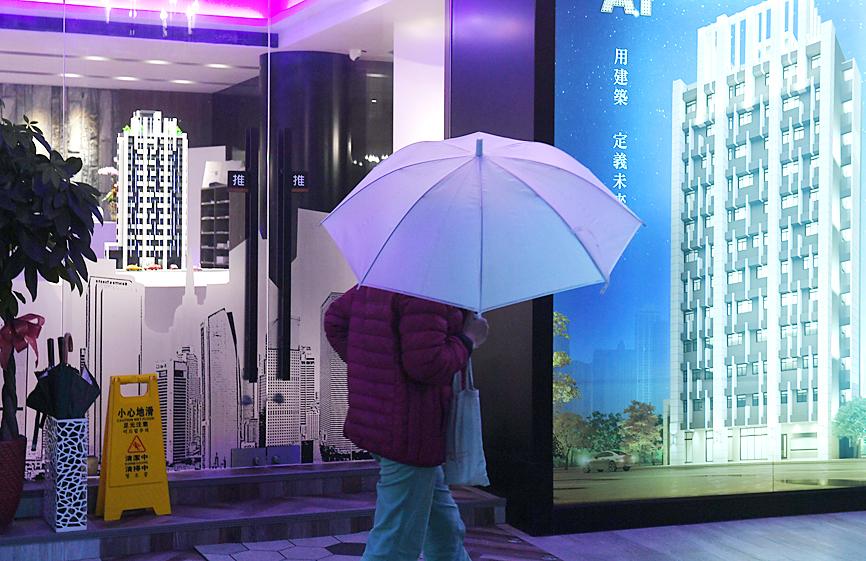About 50 percent of the public said that a local COVID-19 outbreak had reduced their income by 10 to 50 percent, severely constraining their ability to honor mortgage and credit card obligations, a survey released yesterday by Chinatrust Real Estate Co (中信房屋) found.
The survey came after the Directorate-General of Budget, Accounting and Statistics (DGBAS) last week said that the public health crisis raised the unemployment rate for May to 4.11 percent, putting 126,000 people out of work.
Last month, the situation likely deteriorated further due to lingering restrictions on movement and gatherings, the DGBAS said.

Photo: CNA
The results showed that 49.6 percent of respondents said that a nationwide level 3 COVID-19 alert had negatively affected their incomes, with reductions of 10 to 50 percent over the past two months.
Ten to 16 percent of respondents said that income erosion had made it more difficult to pay their mortgage and credit card bills.
Chinatrust Real Estate said that people should not suspend debt payments without the creditor’s prior approval, as that would damage their credit history and make dealings with the creditor more difficult.
On a NT$10 million (US$357,181) house with a 20-year mortgage at 1.31 percent interest, people typically have a monthly mortgage payment of NT$47,000, the real-estate broker said, adding that this is a heavy financial burden for homeowners who have had their hours reduced, been furloughed or lost their jobs due to the outbreak.
In May, the average take-home pay fell 12.05 percent for jobs in the entertainment and recreational sectors, 4.68 percent in the hospitality industry and up to 5.2 percent for other service-sector jobs, DGBAS data released on Monday showed.
People unable to pay their creditors should contact them and request a grace period, a moratorium or some other arrangement that could extend their overall debt payment schedule, but avoid punitive consequences, Chinatrust Real Estate said.

SECTOR LEADER: TSMC can increase capacity by as much as 20 percent or more in the advanced node part of the foundry market by 2030, an analyst said Taiwan Semiconductor Manufacturing Co (TSMC, 台積電) is expected to lead its peers in the advanced 2-nanometer process technology, despite competition from Samsung Electronics Co and Intel Corp, TrendForce Corp analyst Joanne Chiao (喬安) said. TSMC’s sophisticated products and its large production scale are expected to allow the company to continue dominating the global 2-nanometer process market this year, Chiao said. The world’s largest contract chipmaker is scheduled to begin mass production of chips made on the 2-nanometer process in its Hsinchu fab in the second half of this year. It would also hold a ceremony on Monday next week to

TECH CLUSTER: The US company’s new office is in the Shalun Smart Green Energy Science City, a new AI industry base and cybersecurity hub in southern Taiwan US chip designer Advanced Micro Devices Inc (AMD) yesterday launched an office in Tainan’s Gueiren District (歸仁), marking a significant milestone in the development of southern Taiwan’s artificial intelligence (AI) industry, the Tainan City Government said in a statement. AMD Taiwan general manager Vincent Chern (陳民皓) presided over the opening ceremony for the company’s new office at the Shalun Smart Green Energy Science City (沙崙智慧綠能科學城), a new AI industry base and cybersecurity hub in southern Taiwan. Facilities in the new office include an information processing center, and a research and development (R&D) center, the Tainan Economic Development Bureau said. The Ministry

ADVERSARIES: The new list includes 11 entities in China and one in Taiwan, which is a local branch of Chinese cloud computing firm Inspur Group The US added dozens of entities to a trade blacklist on Tuesday, the US Department of Commerce said, in part to disrupt Beijing’s artificial intelligence (AI) and advanced computing capabilities. The action affects 80 entities from countries including China, the United Arab Emirates and Iran, with the commerce department citing their “activities contrary to US national security and foreign policy.” Those added to the “entity list” are restricted from obtaining US items and technologies without government authorization. “We will not allow adversaries to exploit American technology to bolster their own militaries and threaten American lives,” US Secretary of Commerce Howard Lutnick said. The entities

Minister of Finance Chuang Tsui-yun (莊翠雲) yesterday told lawmakers that she “would not speculate,” but a “response plan” has been prepared in case Taiwan is targeted by US President Donald Trump’s reciprocal tariffs, which are to be announced on Wednesday next week. The Trump administration, including US Secretary of the Treasury Scott Bessent, has said that much of the proposed reciprocal tariffs would focus on the 15 countries that have the highest trade surpluses with the US. Bessent has referred to those countries as the “dirty 15,” but has not named them. Last year, Taiwan’s US$73.9 billion trade surplus with the US